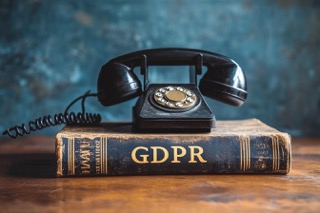How to Stay Compliant: GDPR Recording Phone Calls UK Explained Last Updated by PurpleBox | June 7, 2025 | Category: VoIP Read Time: 7 minutes Thinking about GDPR recording phone calls UK? Whether you’re running a business or just curious about the legal side of call recording, there’s a lot to unpack. Don’t worry—we’ve simplified it all. From consent to compliance, we’ll walk you through everything you need to know to stay on the right side. Key Takeaways: Recording calls in the UK is legal—but if you’re storing or using the data, GDPR kicks in with strict rules about consent and data handling. Consent isn’t always required, but you must have a valid legal reason—like fulfilling a contract or complying with a legal obligation. GDPR affects different industries differently—finance, healthcare, and customer service all have extra layers of compliance. Failing to follow the rules can cost you big time—the ICO can issue fines up to £17.5 million or 4% of your annual turnover. What is the legal framework for recording phone calls in the UK? Let’s be real—recording a phone call in the UK can sound like something straight out of a spy movie. But in reality, it’s often just a practical business tool or a way to keep track of important details. That said, there’s a tight legal web around it—and we’re here to untangle it for you. RIPA – Regulation of Investigatory Powers Act 2000 RIPA allows individuals to record calls for personal use—no consent needed. So if you’re just recording a chat with Auntie Miriam to remember her brisket recipe, you’re good. But the moment a third party is involved (like a business), things change. Data Protection Act 2018 & GDPR When call recordings involve personal data—names, addresses, opinions, or anything identifiable—GDPR kicks in. Under the Data Protection Act 2018, which incorporates GDPR into UK law post-Brexit, businesses must have a lawful basis for recording, like consent or legitimate interest. Telecommunications (Lawful Business Practice) Regulations 2000 This regulation allows businesses to record calls without consent, only for specific reasons like preventing crime, ensuring regulatory compliance, or training staff. But if you’re doing it for marketing or snooping? Nope. You’ll need consent. Can voice recordings be used in court? Yes—voice recordings can be used as evidence in UK courts, provided they’re lawfully obtained. Here’s a great guide explaining how voice recordings can be used in court, especially in family law disputes. Why is GDPR important for call recording practices? GDPR isn’t just another legal buzzword—it’s the rulebook when it comes to handling personal data, including phone calls. What counts as personal data? Anything that can identify someone—their name, email, voice, even their opinions. Yep, their voice alone can be considered personal data under GDPR. So, if you’re recording a call, you’re very likely recording personal data too. Why does this matter for businesses? Because if you’re recording and storing calls that include personal data, you need a legal basis to do it—and you have to let the person know. Think of it as the digital version of a “This call may be recorded” message. Fail to do that? You could be slapped with a fine up to £17.5 million or 4% of your global turnover—whichever stings more. The upside of GDPR compliance Sure, GDPR may sound scary. But being compliant builds trust with your customers. They know their information is safe, and your processes are professional. We’ve seen many UK businesses feel more confident about compliance once they’ve set up GDPR-friendly call recording, especially when using VoIP systems like those discussed in our business phone solutions guide. When is consent required for recording phone calls? Let’s clear this up—you don’t always need consent to record a phone call in the UK, but in many situations, especially for businesses, you absolutely do. Here’s when explicit consent is required: You’re recording calls for marketing, training, or quality assurance You plan to store or analyse personal data You’re dealing with sensitive or confidential info And here are exceptions where consent may not be needed, but the caller still needs to be informed: To fulfil a contract (like confirming orders) To comply with a legal obligation (e.g. FCA rules) If it’s in the business’s legitimate interest (e.g. fraud prevention) Tip: Always inform the caller at the start of the call—either through a recorded message or live disclosure. It builds trust and keeps you covered. Funny (but true) story: One business owner we worked with forgot to tell customers their calls were being recorded. A week later, a caller found out and said, “I hope you didn’t catch me humming along to your awful hold music!” It started as a joke—but ended in a formal complaint. They now open every call with a clear disclaimer… and changed their hold music, just to be safe. So, rule of thumb? If you’re not sure—get consent. It’s way easier than dealing with awkward calls and even more awkward fines. How does GDPR affect call recording in specific industries? Not all industries are treated equally when it comes to GDPR and call recording. Depending on what you do, the rules can go from “reasonable” to “regulation overload” very quickly. Financial Services If you’re in finance, the Financial Conduct Authority (FCA) has your number—literally. You’re often legally required to record calls related to client orders, transactions, or financial advice. These recordings must be securely stored for at least five years. There’s no wiggle room here. Tip: Make sure your call recording system can tag and store calls by date and client reference. It saves a lot of headaches during audits. Healthcare Sector Working in healthcare? You’re likely dealing with special category data—which means even stricter GDPR requirements. Consent should be explicit, storage must be ultra-secure, and access should be restricted to authorised staff only. We worked with a private clinic that used FTTP to upgrade their call handling system—making secure and compliant call storage far easier. Customer Service & Training This is where

